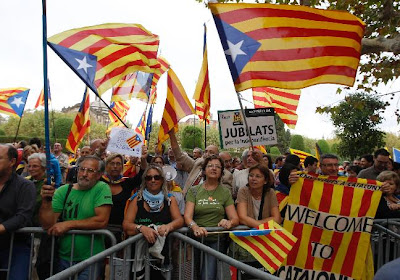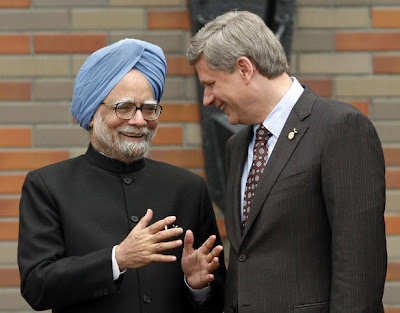The recent rise of the far-right
United Kingdom Independence Party (
UKIP), which wants the
U.K. to leave the
European Union (
E.U.), has shaken up British politics. Next month’s general election is not at all shaping up to be the usual American-style horse race between the left-of-center
Labour Party and right-of-center
Conservative Party, with the more lefty
Liberal Democratic Party (currently in a coalition government with the Conservatives) as a side show. In last year’s elections to the
European Parliament, UKIP became the largest party in the U.K.’s delegation, but the UKIP phenomenon is far from being a flash in the pan, even though the largely toothless European Parliament attracts far more protest votes than the more consequential general elections do: UKIP is actually the third-largest party in the U.K. now. And a further complication is the surge in support for the separatist
Scottish National Party (
S.N.P.) (at Labour’s expense) after last year’s narrowly defeated independence referendum in
Scotland. Next month’s election will have serious geopolitical consequences as no British election in recent memory has.
This means that Conservatives and Labour have to some extent resigned themselves to the groundswell of populist centrifugal forces likely to define the U.K.’s future. Prime Minister
David Cameron has already capitulated to UKIP by promising, if he is reelected, to hold a referendum on continued E.U. membership, and during the run-up to the Scottish referendum his government instituted a raft of new powers of self-government, for not only Scotland but
Wales and
Northern Ireland as well. These developments are convergent: UKIP would also like a more decentralized Britain. But
Nigel Farage, UKIP’s bombastic leader, a self-described libertarian, has scoffed at the S.N.P.’s and the Scottish public’s overwhelming desire to stay in the E.U. but leave the U.K. He has called Scottish nationalism a “fraud” which aspires merely to “swap your masters from Westminster to Brussels.” (See article from this blog
here and
here on the question of whether Scotland
could leave Britain but stay in the Union.)
 |
| Nigel Farage—now destroyer of empires, as well? |
One unexpected reverberation of this political earthquake is policy toward the U.K.’s overseas territories. In the past, Farage has called for a special Member of Parliament to represent colonies like
Gibraltar and the
Falkland Islands. Presumably this would overlay the current self-government in those territories which fill the role an M.P. in London would for most areas of governance. As Farage points out, citizens in the overseas territories have no say in those functions still reserved to Westminster: currency, defense, and foreign relations. (This is similar to
Puerto Rico’s relationship to the
United States (
as discussed earlier in this blog).)
The rethinking has already begun in Gibraltar: the territory’s Chief Minister,
Fabian Picardo,
said this week that in the event of a “Brexit”—as the media have dubbed UKIP’s hoped-for secession from the E.U.—Gibraltar would want to stay
in the Union. “The only existential threat to our economy,” Picardo told the conservative
Daily Telegraph, “is one where we are pulled out of the European Union against our will and denied access to the single market. I think everybody who is serious about the subject, even those whose views I don’t share, talk about retaining access to Europe as a member of the European economic area. I know that there are many in the U.K. who advocate the U.K. moving out of the E.U. who consider themselves to be very good friends of Gibraltar, but they need to understand the economics of this.” Gibraltar is the only overseas U.K. territory that is not in the E.U. (though some far-flung possessions of E.U. member states are in it, notably
French Guiana and other
French territories like
Réunion and
Mayotte in the Indian Ocean and
Guadeloupe and
Martinique in the Caribbean, as well as
Spain’s special municipalities of
Ceuta and
Melilla and its
Canary Islands, which are all geographically African).
Picardo’s words echo the position not only the S.N.P. in Scotland but of
Plaid Cymru, the nationalist party in Wales: both demand that their countries be allowed binding local referenda on E.U. membership in the event of a U.K.-wide vote on the question. The E.U. is only really unpopular in England, not in other parts of the U.K. But in Gibraltar the statement represents a serious reversal of thinking on the status of “the Rock,” as locals call the two-and-a-half-square-mile peninsula jutting off Spain’s mainland. Gibraltarians, after all, have never favored independence. In a 2002 referendum on Gibraltar’s status, confirming a similar result in 1967, more than 98.97% of the 30,000 or so residents opposed any change in status. This ranks among history’s most thunderously near-unanimous votes against changing the status of a territory, alongside similar polls in the Falkland Islands (where residents in 2013 backed the status quo 1,513 to 3) and the
Cocos Islands (where, in 1983, only 9 out of 261 wanted independence from
Australia).
 |
| These Gibraltar residents don’t care which flag flies over them. |
But is Picardo thinking of what would amount to independence—continued membership in the E.U. on its own? (it would make it the Union’s tiniest member state, smaller by far even than
Luxembourg or
Malta)—or is he thinking of joining Spain? Surely not the latter, since Spain’s ongoing claims on the territory are the chief source of Gibraltarian indignation that has energized opposition to change.
A quick history review: the Spanish claim go goes back to 1700, when the death of Spain’s childless
King Carlos II, left him with no clear successor. Carlos was a member of
Austria’s
Habsburg dynasty, so the Britain,
Prussia, and
Portugal wanted the crown to pass to the Austrian kaiser’s son,
Archduke Karl—um, I mean,
Carlos—while France and
Bavaria backed a candidate from France’s royal family, the
House of Bourbon. Thus began the War of the Spanish Succession. The Bourbons and their supporters prevailed: the prospective
Carlos III stayed
Karl and later became Holy Roman Emperor, and a Bourbon sits on the throne in Madrid even today. But the end of the war in 1714 sorted out lots of outstanding territorial squabbles around the world among the European powers: France gave big chunks of
Canada to Britain, for example, and Spain lost numerous colonies, including
Sicily and what are now the
Netherlands and
Belgium. Since the British and Spanish were in the midst of a long struggle for naval supremacy,
Queen Anne of Great Britain negotiated hard, and successfully, for her consolation prize, Gibraltar, ownership of which meant theoretical control of trade through the narrow passage between the Mediterranean Sea and the open Atlantic.
 |
| No Mediterranean climes for Archduke Karl; he had to settle for this measly job. |
The Spanish have never gotten over this, even now that shared membership in the E.U. means the border between Gibraltar and the Spanish mainland amounts to very little (though Spain routinely tests British patience by imposing punitive border controls from time to time). Spanish political candidates thunder on about taking back the Rock whenever patriotism needs to be whipped up before an election. The Spanish royal family even boycotted
Queen Elizabeth II’s diamond jubilee in 2012 over the issue (
as reported on at the time in this blog)—which in terms of historical memory and emotional maturity is sort of equivalent to what it would be like if David Cameron refused to shake hands with
Barack Obama because he was still pouting over mean things said about
King George III during the Boston Tea Party.
 |
| Cars lined up during one of Spain’s capriciously imposed border delays |
On the Spanish side, nationalists have been eyeing Gibraltar hungrily in the wake of UKIP’s rise as well. Professor
Alejandro del Valle Gálvez, a Gibraltar expert at Spain’s
University of Cádiz,
says the time is ripe for Madrid to pursue “the democratic control of the British base, a
modus vivendi agreed on legal and finance issues whilst negotiations take place for a definitive international status for Gibraltar that is accepted by all parties.” In other words, they want to push and push until Gibraltarians give in and resort to Spanish rule. Del Valle envisions the current British territory and the “
Campo de Gibraltar”—the adjacent administrative district in Spain’s autonomous
Andalusia region—to merge as a city-state that could become a “
Monaco of the Strait.” (A big difference, of course, would be that the
Principality of Monaco allows citizens to choose who governs them, in conformity to international norms.)
 |
| Brits and Spaniards stare each other down across one of the world’s shortest land borders. |
There is another reason that Gibraltar will never choose Spain over independence or leaving the E.U.: Spain itself is among the Union’s economic basket cases, and it is not inconceivable that a “Spexit” could be in the works, too, leaving the Rock with the worst of both worlds. But Spain’s relationship to the E.U. and the financial crisis that began in 2008 is as complex as Britain’s: in particular, Spain’s most economically successful region,
Catalonia, has been pushing as hard for independence recently as Scotland has (though so far against deal-killing pushback from the mother country). Catalan separatists are eager to avoid the punitive effects of economic mismanagement that they believe Spain—along with the fellow member states Portugal,
Greece,
Cyprus, and
Italy—have brought upon themselves. If Catalonia were independent, it would never be forced to quit the euro or leave the Union, though what was left of Spain, without its wealthiest region, would be more likely to do either.
So, in my opinion, the solution is obvious: Gibraltar can avoid both UKIP’s economically suicidal policies and Spain’s, and stay in the E.U. as well, by joining an independent Catalonia. The two entities do not border each other, but Barcelona is certainly nearer Gibraltar than London is. Catalonia is already a playground for hordes of vacationing Britons. And there is a deep historical tie: the then quasi-independent Catalonia sided with Britain, not the Spanish, in the War of the Spanish Succession. In 1704, over 300 Catalans defended the Rock from the Habsburgs; a local beach is named in their honor. And the king-making
Republican Left of Catalonia (
Esquerra Republicana de Catalunya, or
E.R.C.) party in Catalonia’s separatist ruling coalition scandalizes mainstream opinion in Spain by refusing to side with Madrid on Gibraltar (
as discussed in an article in this blog). (
Basque separatists, by contrast, want Spain to reclaim Gibraltar, making them more than a bit hypocritical on the question of whether a referendum on being or not being part of Spain should be binding.)
 |
| Gibraltar’s flag |
On the other hand, if Spain’s
King Felipe VI would really and truly like to undo the Treaty of Utrecht, he is perfectly free to step aside and let 54-year-old
Karl von Habsburg, a private citizen living in Salzburg, to take over the throne in Madrid.
 |
For use in case of reconquista: outgoing King Juan Carlos places the sash of Captain General
of Spain’s royal armed forces on his son and successor, King Felipe VI. |
[You can read more about Gibraltar, Scotland, Catalonia, UKIP, and other movements, both famous and obscure, in my new book, a sort of encyclopedic atlas just published by Litwin Books under the title Let’s Split! A Complete Guide to Separatist Movements and Aspirant Nations, from Abkhazia to Zanzibar. The book, which contains 46 maps and 554 flags (or, more accurately, 554 flag images), is available for order now on Amazon. Meanwhile, please “like” the book (even if you haven’t read it yet) on Facebook and see this special announcement for more information on the book.]




























































